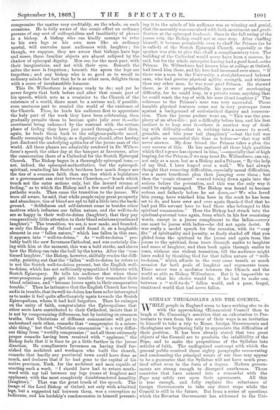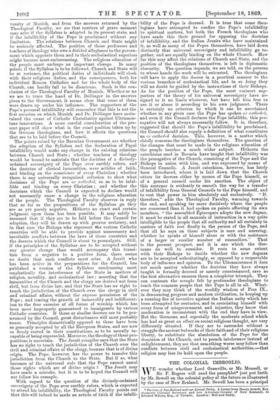GERMAN THEOLOGIANS AND THE COUNCIL.
WHILE people in England seem to have nothing else to do with the approaching (Ecumenical Council than to laugh at Dr. Cumming's assertion that an exhortation to Pro- testants to turn from the error of their ways is an invitation to himself to take a trip to Rome, foreign Governments and theologians are beginning fully to appreciate the difficulties of their position. It has been already stated that two great objects of the Council are to proclaim the infallibility of the Pope, and to make the propositions of the Syllabus into articles of faith. The undisguised contempt with which the general public received those eighty paragraphs enumerating and condemning the principal errors of our time may appear to be a guarantee that the Syllabus will not have much prac- tical effect even in the form of a dogma. Modern govern- ments are strong enough to disregard anathemas. Those countries that have entered into a concordat with the Pope may safely rest upon their agreements. All this is true enough, and fully explains the reluctance of foreign Governments to take any direct steps while the Council is still in the future. But from a series of questions which the Bavarian Government has addressed to the Uni-
versity of Munich, and from the answers returned by the Theological Faculty, we see that matters of grave moment may arise if the Syllabus is adopted in its present state, and if the infallibility of the Pope is proclaimed without any limitation. The relations between Church and State might be seriously affected. The position of those professors and teachers of theology who owe a divided allegiance to the govern- ment which appoints them and to their ecclesiastical superiors might become most embarrassing. The religious education of the people must undergo an important change. In many points, if the Syllabus is to be followed, Church and State will be at variance, the political duties of individuals will clash with their religious duties, and the consequences, both for individual Roman Catholics and for the whole body of the Church, can hardly fail to be disastrous. Such is the con- clusion of the Theological Faculty of Munich. Whether or no we are to trace the hand of Dr. Dollinger in the answers given to the Government, it seems clear that some of them were drawn up under his influence. The supporters of the Pope's personal infallibility will remember that this is not the first occasion on which Munich and Dr. Dollinger have main- tained the cause of Catholic Christianity against Ultramon- tane innovations. A more careful consideration of the pre- sent paper will show what is the exact position taken up by the German theologians, and how it affects the questions that are to be laid before the Council.
The points raised by the Bavarian Government are whether the adoption of the Syllabus and the declaration of Papal infallibility would make any change in the existing relations between Church and State ; whether teachers of theology would be bound to maintain that the doctrine of a divinely- ordained sovereignty of the Pope over earthly rulers, and the doctrine of clerical immunities, were articles of faith, and binding on the conscience of every Christian ; whether there is any universally recognized criterion to show what decisions of the Pope are ex cathedra, so as to be infal- lible and binding on every Christian ; and whether the doctrines which the Council is expected to declare would not necessarily cause a change in the religious education of the people. The Theological Faculty observes in reply that so far as the propositions of the Syllabus go they are as yet purely negative. Hitherto no exact and certain judgment upon them has been possible. It may safely be assumed that if they are to be laid before the Council for adoption, they will be drawn up with greater certainty, and in that case the Bishops who represent the various Catholic countries will be able to provide against unnecessary and inevitable conflicts between the laws of those countries and the decrees which the Council is about to promulgate. Still, if the principles of the Syllabus are to be accepted without any greater change than would accompany this transi- tion from a negative to a positive form, there seems no doubt that such conflicts must arise. A Jesuit who has been active in the preparations for the Council, has published a version of the Syllabus condemning most emphatically the interference of the State in matters of religion, morality, and ecclesiastical law ; asserting that the immunities of the Church and the clergy are derived not from civil, but from divine law, and that the State has no right to touch the jurisdiction of the Church over the clergy in civil and criminal affairs, without the express permission of the Pope ; and tracing the growth of immorality and indifferent- ism to the free exercise of all forms of worship which has been most improperly guaranteed to immigrants by various Catholic countries. If these or similar decrees are to be pro- nounced by the Council, great disturbances will most probably ensue. Principles diametrically opposed to these have been so generally accepted by all the European States, and are now so firmly rooted in their constitutions, as to be morally in- capable of being superseded. Moreover, the theologyof these pro- positions is uncertain. The Jesuit compiler says that the State has no right to touch the jurisdiction of the Church over the civil and criminal affairs of the clergy, because that is of divine origin. The Pope, however, has the power to transfer this jurisdiction from the Church to the State. But if so, what becomes of the universal rule that the Pope cannot annul those rights which are of divine origin I The Jesuit may have made a mistake, but it is to be hoped the Council will not follow his example.
With regard to the question of the divinely-ordained sovereignty of the Pope over earthly rulers, which is expected to attend his infallibility, the Theological Faculty points out that this will indeed be made an article of faith if the infalli-
bility of the Pope is decreed. It is true that some theo- logians have attempted to confine the Pope's infallibility to spiritual matters, but both the French theologians who have made this their ground for opposing the doctrine of infallibility, and the Italian Jesuits who have maintained it, as well as many of the Popes themselves, have laid down distinctly that universal sovereignty and infallibility go to- gether, and are equally binding on the whole Church. How far this may affect the relations of Church and State, and the position of the theologians themselves, is left in diplomatic obscurity. The question depends, we are told, on the persons to whose hands the work will be entrusted. The theologians will have to apply the decree in a practical manner to the various branches of ecclesiastical life, and in so Going they will no doubt be guided by the instructions of their Bishops. As for the position of the Pope, the most eminent sup- porters of the theory of his universal sovereignty have as- signed to it no limits whatever, but have left him free to use it or abuse it according to his own judgment. There is certainly no criterion by which it can be ascertained whether in any given case the Pope has spoken ex cathedra, and even if the Council declares the Pope infallible, this pre- rogative will not always necessarily follow. It is, therefore, suggested that should the Pope's infallibility be proclaimed, the Council should also supply a definition of what constitutes an ex cathedra decision. This, however, is a matter which chiefly concerns the theologians themselves. The question of the changes that must be made in the religious education of the people touches a much wider subject. Hitherto the catechisms used in Bavaria have taught that infallibility was the prerogative of the Church, consisting of the Pope and the Bishops in union with him, and was expressed by means of General Councils. A Jesuit catechism, however, has lately been introduced, where it is laid down that the Church utters its decrees either by means of the Pope himself, or of a general council under his sanction. The object of this sentence is evidently to smooth the way for a transfer of infallibility from General Councils to the Pope himself, and to vest that power in him absolutely and exclusively. " If, therefore," adds the Theological Faculty, warming towards the end, and speaking far more decisively where the people are concerned than it had spoken on points affecting its own members, " the assembled Episcopate adopts the new dogma, it must be stated in all manuals of instruction in a way quite intelligible to the people that all authority and all certainty in matters of faith rest finally in the person of the Pope, and that all he says on these subjects is sure and unerring, whether he speaks of himself alone or with the assistance of a larger or smaller number of counsellors." That is the present prospect, and it is one which the Ger- mans do well to consider. It rests to some extent with their Bishops to decide whether the new dogmas are to be accepted unhesitatingly, or opposed by a respectable body of influence and opinion. To the Ultramontanes it does not much matter whether the doctrine they have always taught is formally decreed or merely countenanced, save as the first alternative ensures them a completer triumph. They can contemn the scruple felt by profounder theologians to teach the common people that the Pope is all in all. What- ever they may think of the worldly wisdom of Pius IX., in denouncing progress and modern civilization, in keeping up a running fire of invective against the Italian unity which has been attempted for centuries, and in associating himself with every form of misgovernment and injustice, they know that moderation is inconsistent with the end they have in view. But the Germans, and especially the moderate school which has had so great an effect on recent religious thought, are very differently situated. If they are to surrender without a struggle the ancient bulwarks of their faith and of their religious liberty, to substitute the absolutism of the Pope for the dominion of the Church, and to preach intolerance instead of enlightenment, they see that something worse may follow than conflicts between civil and ecclesiastical authorities,—that religion may lose its hold upon the people.































 Previous page
Previous page